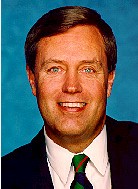Re: FCC decision regarding religious broadcasting.
Date: January 6, 2000.
Source: Office of Rep. Oxley.

| Letter from Rep. Mike Oxley (R-OH) and others
to FCC Chairman William Kennard. Re: FCC decision regarding religious broadcasting. Date: January 6, 2000. Source: Office of Rep. Oxley. |
 |
|
|
|
||
Dear Chairman Kennard:
We are in receipt of your letter of January 12 regarding the FCC's new restrictions on religious speech. We thank you for your unusually rapid response to our correspondence of January 6. Unfortunately, your letter fails to address our fundamental concerns.
Your letter states that "the Commission's decision in this case ... does not establish new rules, but simply clarifies long-standing FCC policy applicable to any broadcaster seeking to use an NCE-reserved channel." Are you telling us that the "additional guidance" in the Commission's order does not constitute a departure from past policy? At least two of your fellow commissioners have a very different view. Whether you call it a rule or a "clarification," the Commission's guidance is designed to force religious broadcasters seeking to hold a noncommercial television license to cut back on traditional religious programming (or "proselytizing," to use the Commission's term) and replace it with FCC-approved educational content.
Your letter goes on to claim that "these standards ... never operate to prohibit the airing of any particular noncommercial programming, religious or otherwise." Well yes, actually, they do. As a condition of receiving its license, the applicant in WQED Pittsburg (FCC 99-393) was compelled to cut back on its religious content. Particular religious programming was eliminated from the schedule. While it may not have been prohibited in the sense of being specifically banned, the result is the same. It is not being aired. This amounts to censorship of religious expression by other means.
Your letter also neglected to address our concerns about the Commission's failure to follow appropriate rulemaking procedures. As Commissioners Powell and Furchtgott-Roth stated in their dissent in part, "we object to this guidance because it makes a substantial change in the Commission policy toward noncommercial licensees without the benefit of input from the broad class of affected licensees." We also believe that an adjudicatory proceeding is not the appropriate mechanism for executing a substantive change in Commission policy, particularly on an initiative as questionable as the regulation of religious content.
In view of the deep public concern over the Commission's actions, and the apparent failure of the Commission to recognize its errors, we have drafted legislation to overturn the additional guidance of the order in WQED Pittsburg. A copy has been provided to your staff. We would welcome your comments on the measure.
Yours truly,
| Michael G. Oxley Fourth Ohio District |
Chip Pickering Third Mississippi District |
| Steve Largent First Oklahoma District |
Cliff Stearns Sixth Florida District |
cc: Commissioner Susan Ness
Commissioner Harold Furchtgott-Roth
Commissioner Michael Powell
Commissioner Gloria Tristani